Related Research Articles

Jawaharlal Nehru was an Indian anti-colonial nationalist, statesman, secular humanist, social democrat, and author who was a central figure in India during the middle of the 20th century. Nehru was a principal leader of the Indian nationalist movement in the 1930s and 1940s. Upon India's independence in 1947, he served as the country's first prime minister for 16 years. Nehru promoted parliamentary democracy, secularism, and science and technology during the 1950s, powerfully influencing India's arc as a modern nation. In international affairs, he steered India clear of the two blocs of the Cold War. A well-regarded author, his books written in prison, such as Letters from a Father to His Daughter (1929), An Autobiography (1936) and The Discovery of India (1946), have been read around the world. The honorific Pandit has been commonly applied before his name.

Sarojini Naidu was an Indian political activist and poet who served as the first Governor of United Provinces, after India's independence. She played an important role in the Indian independence movement against the British Raj. She was the first indian woman to be president of the Indian National Congress and appointed as governor of a state.

The Indian National Congress (INC), colloquially the Congress Party or simply the Congress, is a political party in India with widespread roots. Founded in 1885, it was the first modern nationalist movement to emerge in the British Empire in Asia and Africa. From the late 19th century, and especially after 1920, under the leadership of Mahatma Gandhi, the Congress became the principal leader of the Indian independence movement. The Congress led India to independence from the United Kingdom, and significantly influenced other anti-colonial nationalist movements in the British Empire.

The Indian independence movement was a series of historic events with the ultimate aim of ending British rule in India also known as British Raj. It lasted until 1947.

The All-India Muslim League (AIML) was a political party established in Dhaka in 1906 when some well-known Muslim politicians met the Viceroy of British India, Lord Minto, with the goal of securing Muslim interests on the Indian subcontinent.

The Assembly of First Nations is an assembly of Canadian First Nations represented by their chiefs. Established in 1982 and modelled on the United Nations General Assembly, it emerged from the National Indian Brotherhood, which dissolved in the late 1970s.
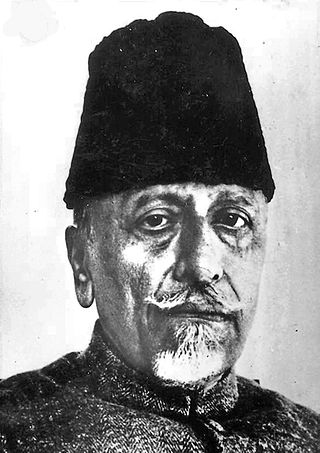
Abul Kalam Ghulam Muhiyuddin Ahmed bin Khairuddin Al-Hussaini Azad ; 11 November 1888 – 22 February 1958) was an Indian independence activist, writer and a senior leader of the Indian National Congress. Following India's independence, he became the First Minister of Education in the Indian government. He is commonly remembered as Maulana Azad; the word Maulana is an honorific meaning 'Our Master' and he had adopted Azad (Free) as his pen name. His contribution to establishing the education foundation in India is recognised by celebrating his birthday as National Education Day across India.

The Indian Medical Association (IMA) is a national voluntary organisation of physicians in India. It was established in 1928 as the All India Medical Association, and was renamed the Indian Medical Association in 1930. It is a society registered under The Societies Act of India.

Muhammad Ali Jauhar was an Indian Muslim activist, founding member of the All-India Muslim League, a preeminent member of Indian National Congress, journalist and a poet, a leading figure of the Khilafat Movement and one of the founders of Jamia Millia Islamia.

Christianity is the third largest religion in Pakistan, making up about 1.27% of the population according to the 2017 Census. Of these, approximately half are Catholic and half Protestant. A small number of Eastern Orthodox Christians, and Oriental Orthodox Christians also live in Pakistan.
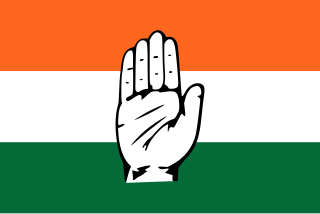
The Indian National Congress was established when 72 representatives from all over the country met at Bombay in 1885. Prominent delegates included Dadabhai Naoroji, Surendranath Banerjee, Badruddin Tyabji, Pherozeshah Mehta, W. C. Bonnerjee, S. Ramaswami Mudaliar, S. Subramania Iyer, and Romesh Chunder Dutt. The Englishman Allan Octavian Hume, a former British civil servant, was one of the founding members of the Indian National Congress.
The Congress of Aboriginal Peoples (CAP), founded in 1971, is a national Canadian aboriginal organization that represents Aboriginal peoples who live off Indian reserves in either urban or rural areas across Canada. As of 2011 more than 70% of Aboriginal people live off-reserve.

The British Raj was the rule of the British Crown on the Indian subcontinent; it is also called Crown rule in India, or Direct rule in India, and lasted from 1858 to 1947. The region under British control was commonly called India in contemporaneous usage and included areas directly administered by the United Kingdom, which were collectively called British India, and areas ruled by indigenous rulers, but under British paramountcy, called the princely states. The region was sometimes called the Indian Empire, though not officially.
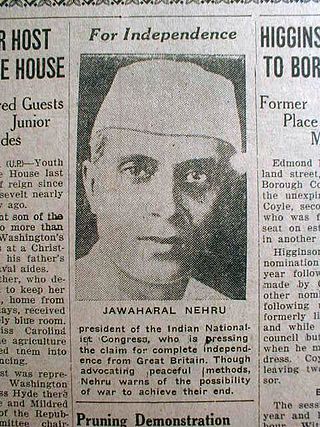
The Declaration of Purna Swaraj was a resolution which was passed in 1930 because of the dissatisfaction among the Indian masses regarding the British offer of Dominion status to India. The word Purna Swaraj was derived from Sanskrit पूर्ण (Pūrṇa) 'Complete', and स्वराज (Svarāja) 'Self-rule or Sovereignty', or Declaration of the Independence of India, it was promulgated by the Indian National Congress, resolving the Congress and Indian nationalists to fight for Purna Swaraj, or complete self-rule/total independence from the British rule

The Indian Association was the first avowed nationalist organization founded in British India by Surendranath Banerjee and Ananda Mohan Bose in 1876. The objectives of this Association were "promoting by every legitimate means the political, intellectual and material advancement of the people". The Association attracted educated Indians and civics leaders from all parts of the country, and became an important forum for India's aspirations for independence. It later merged with the Indian National Congress.
The Trail of Broken Treaties was a 1972 cross-country caravan of American Indian and First Nations organizations that started on the West Coast of the United States and ended at the Department of Interior headquarters building at the US capital of Washington, D.C. Participants called for the restoration of tribes’ treaty-making authority, the abolition of the Bureau of Indian Affairs, and federal investment in jobs, housing, and education.
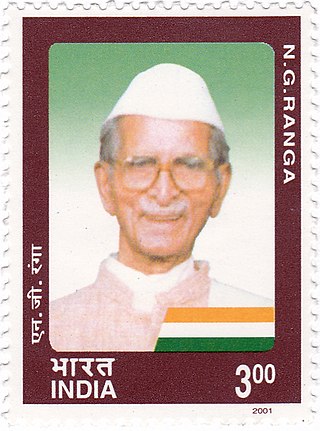
Acharya Gogineni Ranga Nayukulu, also known as N. G. Ranga, was an Indian freedom fighter, classical liberal, parliamentarian and farmers' leader. He was the founding president of the Swatantra Party, and an exponent of the peasant philosophy. He received the Padma Vibhushan award for his contributions to the Peasant Movement. N.G. Ranga served in the Indian Parliament for six decades, from 1930 to 1991.
Pan-Indianism is a philosophical and political approach promoting unity, and to some extent cultural homogenization, among different Indigenous groups in the Americas regardless of tribal distinctions and cultural differences.
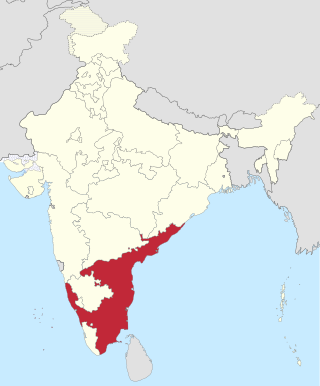
Madras State was a state of India which was in existence during the mid-20th century. The state came into existence on 26 January 1950 when the Constitution of India was adopted and included the present-day Tamil Nadu, Kerala and parts of neighboring states of Andhra Pradesh and Karnataka. Andhra state was separated in 1953 and the state was further re-organized when states were redrawn linguistically in 1956. On 14 January 1969, the state was renamed as Tamil Nadu.

The Legislatures of British India included legislative bodies in the presidencies and provinces of British India, the Imperial Legislative Council, the Chamber of Princes and the Central Legislative Assembly. The legislatures were created under Acts of Parliament of the United Kingdom. Initially serving as small advisory councils, the legislatures evolved into partially elected bodies, but were never elected through suffrage. Provincial legislatures saw boycotts during the period of dyarchy between 1919 and 1935. After reforms and elections in 1937, the largest parties in provincial legislatures formed governments headed by a prime minister. A few British Indian subjects were elected to the Parliament of the United Kingdom, which had superior powers than colonial legislatures. British Indian legislatures did not include Burma's legislative assembly after 1937, the State Council of Ceylon nor the legislative bodies of princely states.
References
- ↑ Narain, V. A. (1968). "THE BRITISH INDIAN ASSOCIATION AND EDUCATION". Proceedings of the Indian History Congress. 30: 330–333. ISSN 2249-1937. Archived from the original on 2021-08-10. Retrieved 2021-08-10.
- ↑ "Indian Association | political organization, India". Encyclopedia Britannica. Archived from the original on 2021-06-07. Retrieved 2021-08-10.
- 1 2 3 4 5 6 Mahmood, ABM (18 June 2021). "British Indian Association, The". Banglapedia . Archived from the original on 2021-08-10. Retrieved 10 August 2021.
- ↑ "British Indian Association Archive". Endangered Archives Programme. Archived from the original on 2021-06-06. Retrieved 2021-08-10.